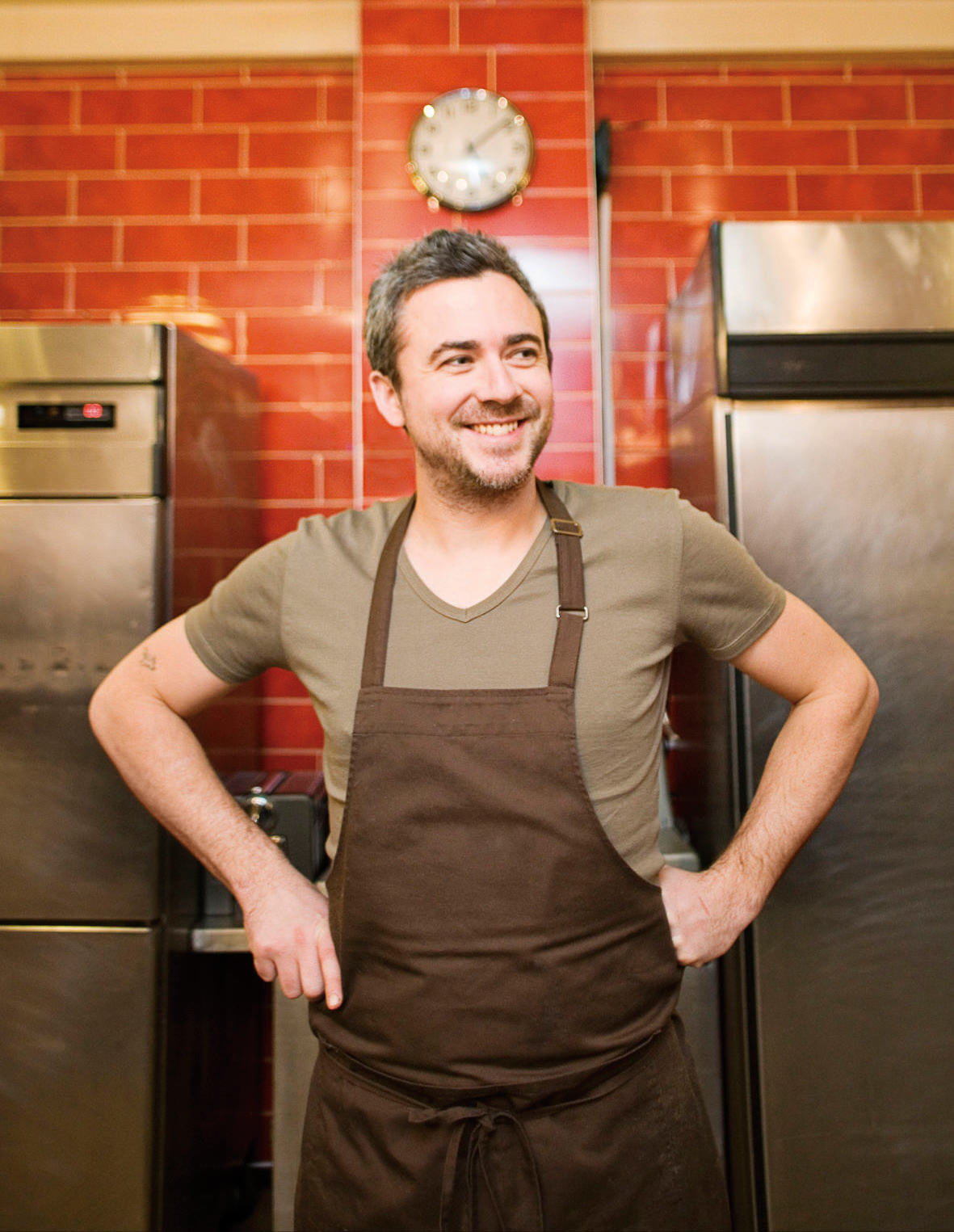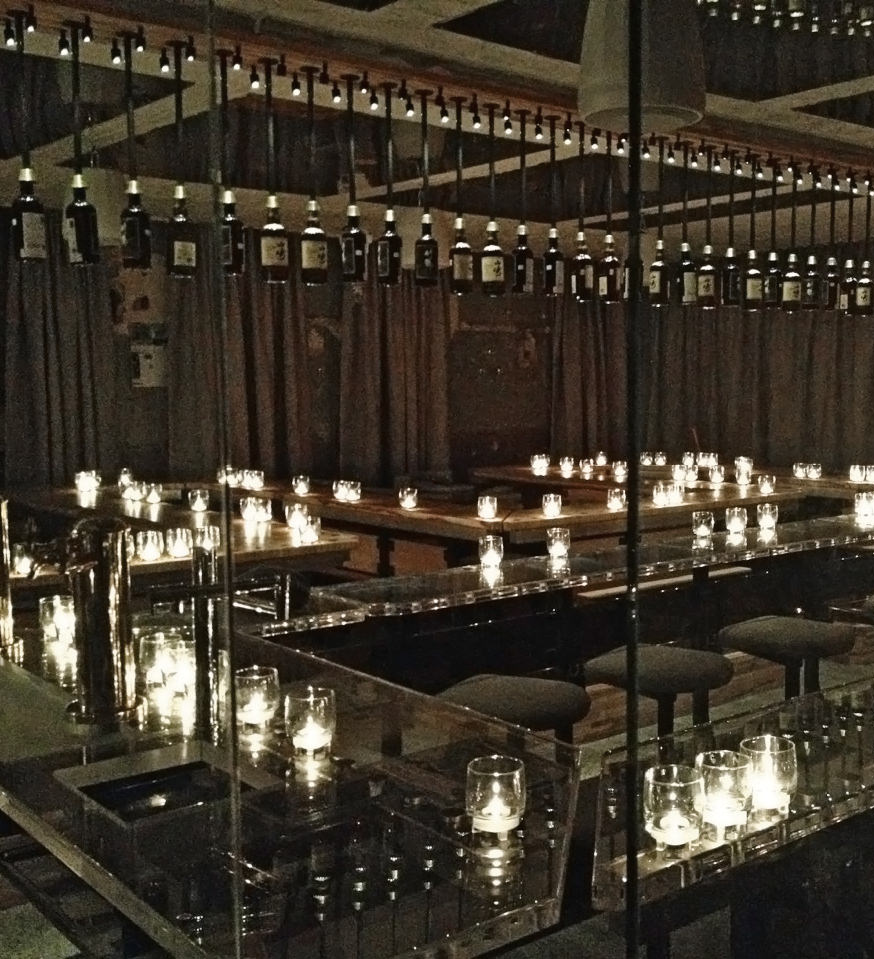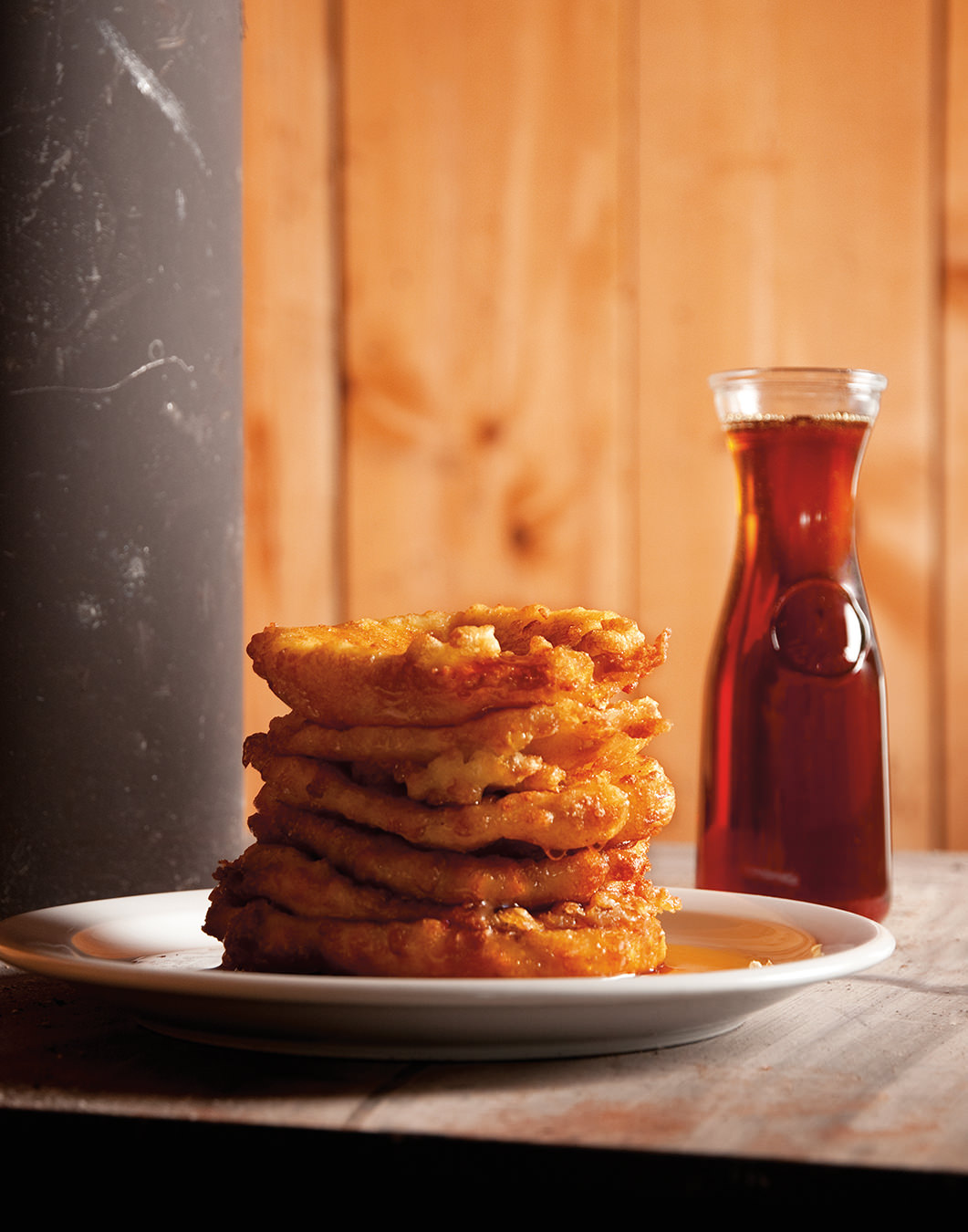Chef Daniel Rose
Spring fever.
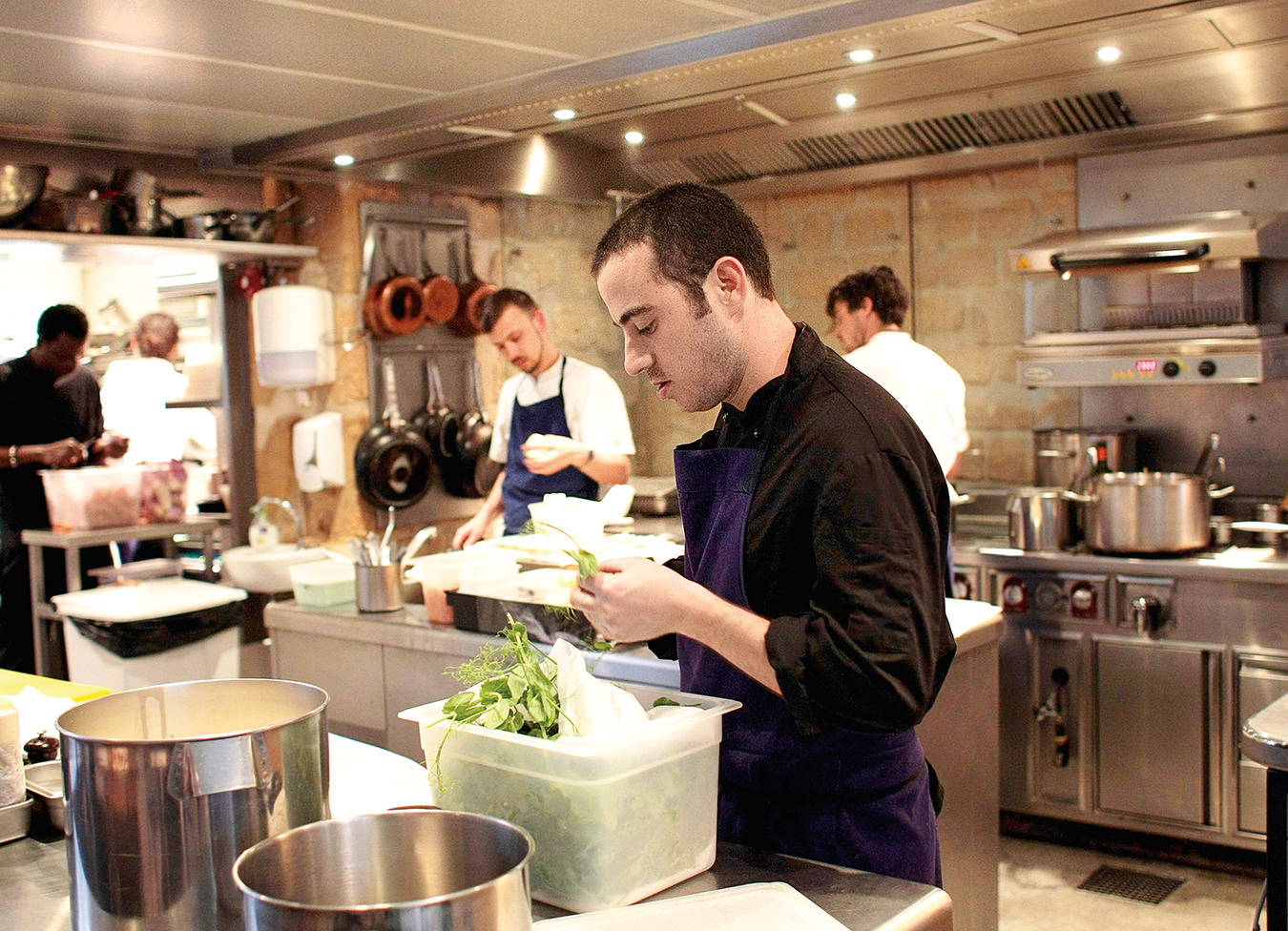
Photo by Emmanuel Fradin.
It’s just after 2 p.m. at Spring, the sharp-and-chic restaurant a few blocks from the Louvre in Paris. Chef/owner Daniel Rose, 35, is leaning on the counter of the open kitchen, discussing the daily deliveries with two colleagues. The evening service is fully booked (it’s not unusual for this 45- to 60-seat restaurant to have weekend waiting lists of 60 people), and already the kitchen is coming to life. Over the course of the next two hours, the remaining staff begin to trickle in, each young cook strapping on his or her blue apron before tackling the mise en place.
Tucked away on a dark side street at number 6 rue Bailleul, Spring doesn’t grab you at first sight. Yet in the three short years since it opened, it has become one of the hottest tickets in town. What’s the appeal? First, perhaps, it’s far from the usual storybook Parisian restaurant. The look is minimalist, as in concrete floors and unadorned white stone walls; the style here is centred on the plate. The set menu changes weekly, and the room’s ambience surrounding all that lovely fare is fun—far from the usual temples de la haute gastronomie we’ve come to expect in Paris.
Opened by Rose seven years ago, Spring started out as a tiny bistro in the 9th arrondissement featuring a €36 menu. With no clear vision of what he wanted to do, Rose chose the name because he wanted to convey an image of renaissance, energy, and youth. Success was swift, so in 2010, the restaurant grew, moving to the 1st arrondissement into a renovated 17th-century house and taking on a more serious style of modern French cuisine.
Don’t think “molecular” here; the local-ingredient-driven plates emphasize texture and flavour over flash and fuss. Recent dishes include raw sea bass from Normandy with oysters, Corsican grapefruit, and veal jus vinaigrette; saddle of lamb with sweetbreads and watercress; pineapple and lychee salad with ginger and vanilla; and passion fruit vacherin. The wine list is another draw, as is the dynamic wait staff.
A native of Chicago, Rose has a different perspective on French cooking than your average Parisian. He has chosen to make his home and build his career in arguably the world’s most famous—and chauvinistic—food city.
But if minimalist decor and a modern French menu were all it had going, Spring would be lost in a sea of similar establishments. What makes this spot so sought after is the chef’s cuisine. A native of Chicago, Rose has a different perspective on French cooking than your average Parisian. But the fact that he has chosen to make his home and build his career in arguably the world’s most famous—and chauvinistic—food city is no mean feat. Think about it: When was the last time you heard about an American making waves on the Paris restaurant scene? Never.
And yet Rose remains beneath the radar. “If it was a goal,” he says, sitting down for a coffee before the dinner rush, “I’d have a Michelin star already. With what we think we know, we could recreate the Michelin-starred experience—no problem. But instead, we make what we like to eat, keeping in mind what customers like to eat, too. There’s a reality here that we’re running a business. The best restaurants are a balance between being creative and pleasing the customer, while keeping employees happy and paid.”
Listening to Rose reel off food cost numbers and talk about profit margins, it’s no surprise to hear he originally came to Paris not to cook but to study art history and mathematics. But what grabbed him most during his studies at the American University of Paris was, as he says, “the mythology of French cooking.” When Rose graduated, he upped and moved to Lyons and enrolled at the Institut Paul Bocuse with one goal in mind: “I wanted to learn to cook.”
On a restaurant landscape dominated of late by European chefs famous for cutting-edge cooking, the choice of Bocuse as mentor may seem an odd one. Not to Rose. “Bocuse is the real deal,” he says, “the great ambassador of French cuisine. His restaurant today may be completely out of mode, but whatever. At his place you’re eating real French cuisine, and there’s a true vibration in the dining room. In comparison, a chef like Ferran Adrià has had zero effect on my cooking.”
That’s quite the bold statement coming from a young chef today, which leads to the question of what he thinks of Chicago’s star chef, Grant Achatz and his famous restaurant, the wildly creative Alinea. “I’ve never eaten there,” says Rose, “I don’t eat like that … But everything is relative. In the end, we all want to serve food that’s satisfying.”
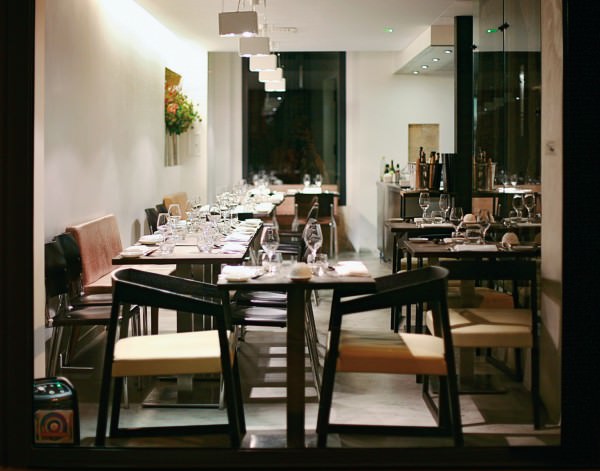
The 45- to 60-seat Spring restaurant in Paris. Photo by Owen Franken.
Rose definitely falls into the less-is-more school of French cooking. “The more I advance in my cooking,” he says, “the less ingredients I use and the more classic it becomes. My goal is purity, but in the French tradition. Too pure, though, and the food becomes Japanese. Not that there’s anything wrong with that, but I’m in France, a country that has an international reputation for being great, with great chefs that influence people who have never even eaten here. That reputation resonates beyond the walls of this restaurant and the country.”
It’s a bit odd when speaking to Rose to hear an American so imbued with the French spirit. Names of French chef icons like Fernand Point, Alain Chapel, and Bocuse pop up often in conversation, and at a time when Danish foraging, Spanish boundary pushing, and Brooklyn bistros are all the rage, Rose remains faithful to his Gallic influences. “I do as little as possible to the ingredients, yet there is technique behind there as well because French cuisine is not a natural cuisine. But I think we have yet to exhaust its potential,” he says. “What I’m striving for in this restaurant is something honest and authentic. And the customers here in Paris understand that. It’s always taste over style. One customer recently told me that the veal I served actually tasted like veal. It was the best compliment I could ask for. It’s not hard to excite someone who never tasted veal before. And the French are tough to impress because they are traditionally so blasé.”
The locals may be hard to excite, but Rose has done just that. The fickle Parisian food press has raved about Rose, and chef Alain Ducasse included Spring as one of the featured restaurants in his ode to the Parisian food scene, the coffee table book J’aime Paris: Mon Paris du goût en 200 adresses. To Rose, the secret of his success is simple: “The French love anything that loves them. My story is a story of my love for France. And my restaurant is an antidote to the usual stuffy Parisian establishment. They called me a rebel, but I wasn’t, and I certainly wasn’t trying to be provocative. I was just doing what I wanted to do.”
The greater challenge for the chef may be impressing tourists who enter with sky-high expectations. “People who come to Paris expect the food here to taste so much better than in their hometowns. Our competition today isn’t the place down the street, but restaurants all over the world. Americans are always looking for a wow. The quality of restaurant food worldwide is getting so much better. The hot chef thing is finished because they can get their star chefs at home,” says Rose. “What saves Paris is that we don’t turn tables, and most of the chefs are in their kitchens. But everything here just has to be so good because the level of food knowledge from the Parisian customer is very high. At least the regular customers have a relationship with us. If they don’t like something, they tell me. It’s that intimacy that makes the food delicious.”
Top photo by Emmanuel Fradin.


